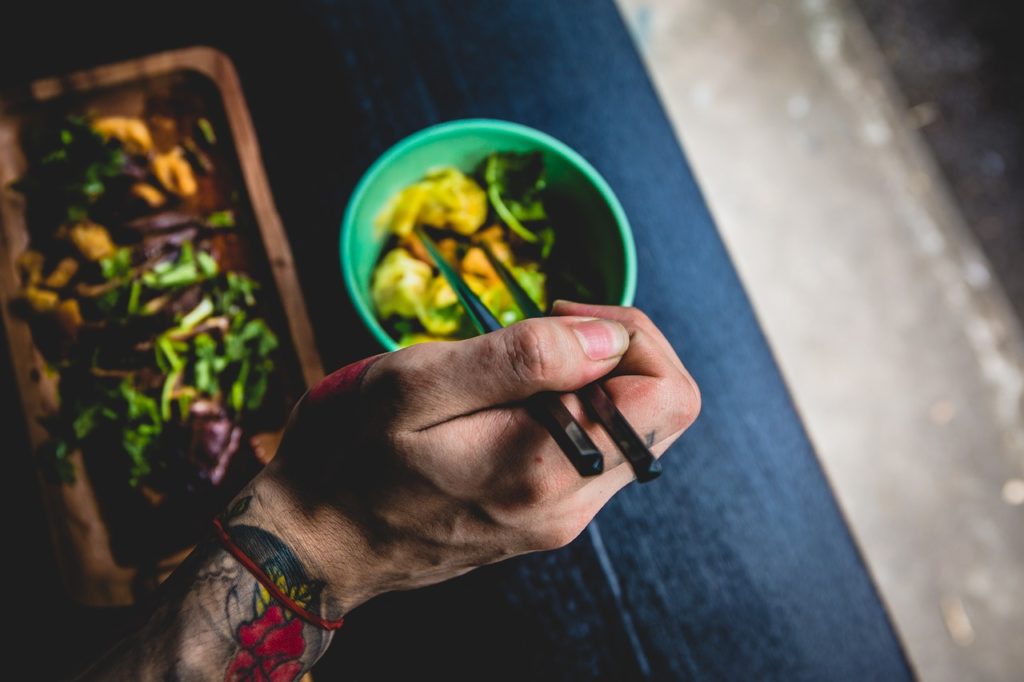If you’ve heard about the many ways being mindful can improve your overall well-being, you might be surprised to see how easy it is to practice mindfulness in everyday life.
After all, don’t you have to sit on a cushion and meditate for at least twenty minutes every day?
While having a regular daily meditation practice is great, it can feel like too much for many people. Soon, they bail on the whole idea and assume that mindfulness just isn’t for them. And that’s too bad.
The Benefits of Mindfulness In Everyday Life
When folks bail on mindfulness, they’re missing out on the many benefits. These include, but are not limited to, improved psychological well-being, lower blood pressure, better sleep, fewer symptoms of depression, increased self-esteem, stress relief, and even help with substance abuse issues.

The thing is, everybody can practice mindfulness. And it doesn’t need to be a rigid practice to be performed at the same time every day. Mindfulness is…well, a state of mind. You can do it just about anywhere and at any time.
Here are three simple ways to infuse a lot more mindfulness into your everyday life.
1. Wake Up and Smell the Intention
Okay, that might sound weird.
But how many mornings do you wake up and immediately start dreading the day – poring over all the not-so-desirable things you need to accomplish? This isn’t a judgment. Almost everyone does or has done it.
Instead, when you first awaken, take a deep breath and connect with your body. What are you feeling? Where are there sensations in your body? Can you be with them rather than try to push them away? How much are you already feeling impacted by your thoughts and feelings? Is your unconscious mind, which is responsible for your all of your behaviors and decision-making, already gearing up for battle?
At this point, you can set an intention to be maybe a little more conscious of what you say and do today. It might be as simple as saying, “I will be more patient with others today.” Or maybe, “I will stay grounded and be kind to myself today.”
Okay, it may feel hokey at first. We get it. But when you make a habit of checking in each morning and setting an intention (even if some days it’s something as simple as, “I will eat at least one vegetable today”), it sets the foundation for your day. It also brings the conscious and unconscious minds together.
That way, when you encounter difficult moments, your unconscious mind doesn’t take over and go into overdrive. You can zoom out and handle these situations with more aplomb and compassion.
2) Be Mindful of More Than Just What You Eat
You’ve heard the saying, you are what you eat. At least, we can assume you have. And you know it’s basically a call to bring awareness to how nutritious the food is that you’re putting into your body.

But have you ever considered how you eat?
Eating healthy foods is great. But if you’re scarfing down that whole-grain bread for emotional comfort, or shoveling 100 blueberries into your mouth while doom- scrolling, you’re not really paying attention to the wonderful ways food fuels your body.
The sheer act of eating is an amazing way to practice being mindful. And it’s pretty enjoyable too! Consider setting aside time today to eat one meal in a completely mindful way.
First, commit to doing just this one thing – eating. Put down the phone, turn off the screen, and step away from all other activities. Sit down and visually take in your meal. Once you begin eating, pay attention to each bite you take. Slow down if needed so you can really notice the taste and texture and scent of your food. Chew slowly and savor each flavor.
You might be surprised by what a different experience this is. Furthermore, you’ll notice your body’s signals when you’re getting full and be less likely to eat more than your body needs.
3) Observe Who You Are You Behind the Wheel
This is a big one.
Have you ever been in the car with someone you considered the nicest person on the planet only to see him or her turn into a raging maniac when behind the wheel? Here’s the bigger question – is that person you?
You’re far from alone. There’s nothing like driving to stir up triggers and kick us into ‘fight or flight’ response. Especially when we get stuck in traffic. When we’re safely tucked behind a metal door and a window while in a traffic jam, it seems safe to yell and scream at other drivers in ways we wouldn’t dream of without the barrier.
Truth is, while you may not get punched in the face, you’re not doing your body any good in that state. So next time you’re in a traffic jam, take a moment to pause and check in with your body. Is your heart pounding? Are you breathing hard? Where are you tense? Can you soften?
Look around you and notice that everyone else is in the same situation you are in. You have the opportunity at that moment to sit back, take some deep breaths, listen to calming music, and maybe notice some features around you (trees, shops, graffiti, whatever) that you regularly miss when just whizzing by.
The more you acknowledge that situations like this are out of your control, the more you’ll see them as gifts.
Mindfulness, Like Everything Else, Takes Practice
Incorporating mindfulness in everyday life may seem weird, counterintuitive, and downright tough. At first.
But with practice, you’ll begin to move in and out of activities in a way that’s more compassionate, meaningful, and aware. This is the practice of mindfulness.
If you’re interested in bringing more mindfulness into your life, contact us today. We offer mobile yoga, meditation, and other mindfulness practices to get you started on this rewarding and life-changing path.



